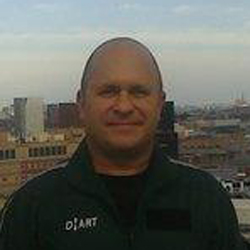Advertisement
In A Darkened House, A Disaster Without A Cure

I ride my ambulance on a wave that hides in plain sight. You don’t have to be a demographer to know it’s coming, that we’re not prepared for it.
Outside, the house is a tidy, single-story ranch on the end of a wooded cul-de-sac.
I’m working the ambulance in my home town, and we’ve been called here because a woman is confused and no one knows what to do with her.
Inside the house, it’s like a bomb has exploded, and what’s left is charnel — couch cushions on the floor, overturned kitchen chairs, family photos scattered like buckshot — more than a metaphor here, I’m sure. Memories fragmenting, the tip-of-the-tongue nature of the faces in the photos and their associated names a bitter pill for the woman who lives here, a woman who once, probably not too long ago, could have told us something about all the people in all those photos.
The kitchen is worse, the almost-barren refrigerator open, the kitchen cabinets mostly without doors, and the ones that have them are hanging by a single hinge.
The cops have been here for 10 minutes already. The woman who lives here alone is a problem without a solution.
The night scene is suffused by a creeping coldness that sinks into your bones in a rush, the kind you only get on a winter night in Massachusetts, in a house like this, where the oil tank has run dry and the pilot light in the furnace long ago flickered out.
the woman looks at me like she’s drowning, her eyes comprehending from just under the surface, begging us to haul her into our lifeboat, to stop the sinking feeling she can’t name.
I find her in a back room.
Mid-60s, gray hair in a wild, unkempt tangle, the tiny woman is wraith-thin and swaying in a tattered, once-white bathrobe and flip-flops, pawing through an immense wallet for some unknown document that will explain all this, that will allow the world to make sense of her, since it doesn’t make much sense to her any more.
I put my arm on her shoulder, slouch my own — less threatening, I think, though I’m not convinced — and lean down.
She frowns at me, says nothing.
I speak slowly and reassure her, but the woman looks at me like she’s drowning, her eyes comprehending from just under the surface, begging us to haul her into our lifeboat, to stop the sinking feeling she can’t name.
In the local city hospital, they keep her warm for the night. Then, with nothing medically wrong to advocate against it, they send her home.
None of the usual paths of care exist for her.
She has no family, no one to speak for her. Her words are unreliable.
Neighbors dote on her. Before the hospital, when we put her on our stretcher, a small line of them forms to give our patient a hug. They seem to think it’s the last they’ll have the chance, but I already know better.
In a 2013 New England Journal of Medicine article, Dr. Eric Larson and his coauthors postulate that, even while the prevalence of elderly dementia is decreasing — perhaps due to in part to better preventative health measures, like reducing risk factors for stroke, among other things — the absolute number of Americans who suffer from the disease will surely rise as the number of people over 75 years of age skyrockets.
Seeking a solution, one of the police officers reaches out to a local elder services agency. They suggest transporting the woman to an infamous shelter in a nearby city, once known as a haven for drugs and the downtrodden. It’s gotten a new name and fresh paint, but the clientele remains the same.
The officers all find the idea repugnant and dismiss it.
A few days later, the kind-hearted emergency room staff at a different community hospital find a way to admit her after a different ambulance crew and different cops go the same address for the same problem, which none of us can solve. For a few days at least, she’s safe and warm and looked after.
After that, who knows?
I see in her a tidal wave looming, and not many people are talking about it.
In my line of work, as a tiny cog in the emergency system, we have plans for pandemic flu, major car accidents, fires, terrorist attacks, chemical spills, heart attacks, snow storms, hurricanes, tornadoes and Ebola.
In the local city hospital, they keep her warm for the night. Then, with nothing medically wrong to advocate against it, they send her home. None of the usual paths of care exist for her.
But for the increasing numbers of dementia patients who find their way into my ambulance each month, both in need of care and not, or more accurately, in need of a kind of care that exists in inadequate quantities?
Nothing.
When it came time to bring our patient to the hospital, she resisted.
Coaxing didn’t work. Rationalizing. Begging. None of it. When we gently took her by the arm, she grabbed doorjambs and scratched blindly at the wall. Finally, I got behind her and lifted her up under her shoulders. My partner took her by the legs, and the moment we hoisted her up, she relaxed, sank into our arms, and surrendered.
She didn't talk to either of us again, just frowned, occasionally puffed air out in exasperation.
But her eyes suggested comprehension, that she’d tell me what was wrong if only the words would come, if they could navigate the rocky shoals that the path from thought to speech had become. When she looked at me, her eyes begged for me to understand, but pulling her into our lifeboat required strength I didn’t have.
